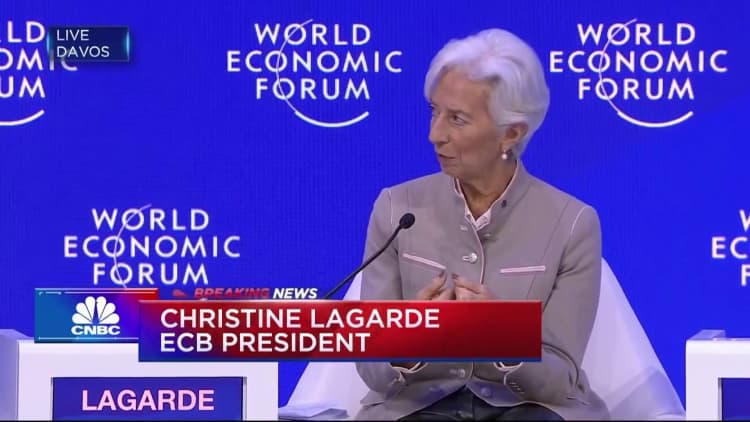Europe is working on a digital currency to avoid a ‘sandwich position’ between the U.S. and China
European officials have for several years been debating the need to be more autonomous and less reliant on other parts of the world, but talks intensified in the wake of the Covid-19 pandemic and then again after Russia’s invasion of Ukraine.
Peter Adams | Stone | Getty Images
The European Central Bank is working on a digital currency as the region seeks to protect itself from tensions with China and the United States.
The central bank started investigating the feasibility of a digital euro back in October 2021.This fall, the heads of state across the EU will have to decide if the ECB should go ahead with the next steps, which include testing the necessary technical arrangements so Europeans can spend digital euros.
“The ECB is worried that the euro zone will end up in a geopolitical and economic sandwich position between the big tech companies of the USA and the payment systems of China without a digital euro. Right now, Europe lacks digital platforms,” Guido Zimmermann, senior economist at German bank LBBW, told CNBC Wednesday.
ECB President Christine Lagarde acknowledged that point during a speech in November. “The entry of big techs into payments could increase the risk of market domination and dependence on foreign payment technologies, with consequences for Europe’s strategic autonomy,” she said.
“Already now more than two thirds of European card payment transaction are run by companies with headquarters outside the European Union,” she added.
Mastercard, Visa, PayPal, Alipay and UnionPay make up the top global companies for payments. None of them are European. The first three are American and the last two are Chinese.
It is a fixation for some, of ensuring the sovereignty or power of the EU.
Daniel Gros
Distinguished Fellow, CEPS
Politicians in Europe do not want consumers or European firms to become dependent on U.S. Big Tech companies for payments, Zimmermann said.
He added that European officials are also trying to avoid a situation in which China becomes the sole determinant of payments on the “Digital Silk Road” — a landmark Chinese project to invest in digitalization across the world.
“The goal, I think it is a fixation for some, of ensuring the sovereignty or power of the EU, is the main driver for the digital euro in Brussels, and in Frankfurt,” Daniel Gros, distinguished fellow at the think tank CEPS, told CNBC via email.
Quest for sovereignty
European officials have for several years been debating the need to be more autonomous and less reliant on other parts of the world, but talks intensified in the wake of the Covid-19 pandemic and then again after Russia’s invasion of Ukraine.
“The relevance of preserving geopolitical sovereignty has increased in recent ECB speeches and publications for a digital euro. This certainly has to do with the outbreak of the Ukraine war and the increasing global geopolitical tensions,” Zimmerman said.
Lagarde said in November that a digital euro “is a common European project” and “would essentially serve wider public policy objectives, such as strengthening Europe’s strategic autonomy.”

Euro versus U.S. Dollar
Recent European discussions about the region’s autonomy have involved raw earth and magnet value chains, which are seen as critical in the transition to a carbon neutral society. They have also involved energy supplies, medical equipment and electric cars.
“The concept [strategic autonomy] has its roots in the EU’s defence and security sector. However, it has become increasingly prominent in recent years as a result of the changing geopolitical context characterized by the increasing competition between the U.S. and China,” Antonio Barroso, managing director at Teneo, told CNBC.
But there’s more behind the plan for a digital euro.
Zsolt Darvas, senior fellow at the Brussels-based think tank Bruegel, attributed ECB action in this area partly to the “growing demand for crypto assets” and the fact that many other central banks are also considering the development of a digital currency.
“The ECB might not wish to be a laggard in terms of adopting new technologies,” he said.

For all the latest World News Click Here
For the latest news and updates, follow us on Google News.

